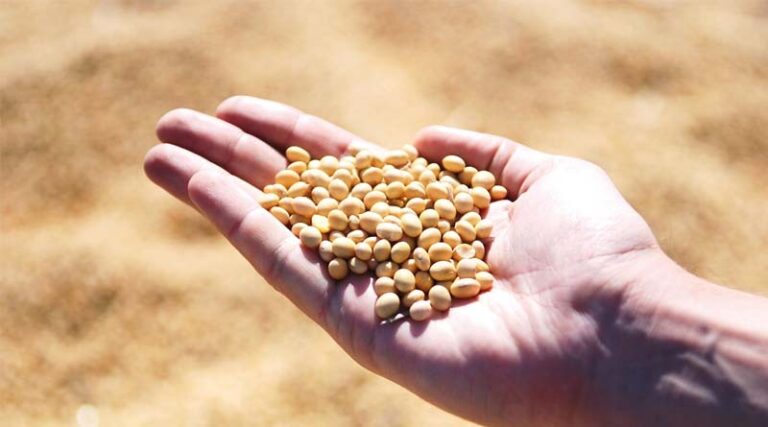
Soybean Nutrient Management in India: The Right NPKS Balance for Record-Breaking Yields
30 June 2025, New Delhi: Achieving high and consistent soybean yields in India depends largely on providing the crop with a balanced supply of essential nutrients. Among these, Nitrogen (N), Phosphorus (P), Potassium (K), and Sulfur (S) play pivotal roles in crop growth, development, and productivity. Proper management of these nutrients not only enhances yield but also improves crop resilience and soil health.
This article outlines the optimal NPKS fertilizer recommendations, sources, and timing strategies that can help soybean farmers worldwide unlock the full yield potential of their crops. This nutrient management strategy has been recommended by ICAR’s National Soybean Research Institute, Indore (Formerly Indian Institute of Soybean Research).
Importance of Balanced Nutrient Supply for Soybean
Soybean is a leguminous crop with the ability to fix atmospheric nitrogen; however, supplemental nitrogen can sometimes be beneficial, especially in early growth stages. Phosphorus supports root development and energy transfer, Potassium regulates water uptake and disease resistance, while Sulfur is vital for protein synthesis and seed quality. A deficiency or imbalance in any of these nutrients can limit yield and crop quality.
Recommended Fertilizer Rates for Soybean Production Zones in India
Fertilizer requirements vary based on soil type, climate, and regional conditions. Here are recommended NPKS rates (in kg/ha) and fertilizer sources for major soybean-producing zones:
| Region | N:P:K:S (kg/ha) | Fertilizer Sources & Quantities |
|---|---|---|
| Central Zone | 25:60:40:20 | Urea 56 kg + Single Super Phosphate (SSP) 375–400 kg + Muriate of Potash (MOP) 67 kg |
| Southern Zone | 25:80:20:30 | Urea 56 kg + SSP 500 kg + MOP 34 kg |
| Northern Plains | 25:75:25:37.5 | Urea 56 kg + SSP 470 kg + MOP 42 kg |
| North-East & Eastern Hill Zones | 25:100:50:50 | Urea 56 kg + SSP 625 kg + MOP 84 kg |
Fertilizer Application Timing and Method
- Basal Application: Apply the entire dose of phosphorus, potassium, and sulfur fertilizers before or at the time of sowing to ensure early availability for root development and growth.
- Nitrogen Split Application: Apply half of the recommended nitrogen at sowing and the remaining half 25-30 days after sowing to support vegetative growth and pod development.
Incorporating organic amendments such as well-decomposed farmyard manure or compost (5–10 tons/ha) before sowing improves soil structure and nutrient availability. Additionally, poultry manure at about 2.5 tons/ha can be beneficial.
Benefits of Following Recommended NPKS Management
- Higher Yields: Balanced nutrients ensure optimum plant growth and seed formation, directly translating into increased yields.
- Improved Crop Quality: Proper sulfur nutrition enhances protein content and seed quality.
- Sustainable Soil Health: Maintaining nutrient balance helps sustain soil fertility and reduces dependence on excessive fertilizer use.
- Stress Resistance: Adequate potassium strengthens plants against drought, pests, and diseases.
Maximising Production
For soybean farmers aiming to maximize their production, adhering to scientifically recommended NPKS fertilization plans tailored to their agro-climatic zone is critical. Along with good agronomic practices, balanced nutrient management can lead to record-breaking soybean yields, better profitability, and sustainable farming systems.
Regular soil testing and crop monitoring are essential to fine-tune fertilizer recommendations and ensure efficient nutrient use. Investing in the right fertilizer strategy today will secure soybean productivity for the seasons to come.
Also Read: UPL continues its commitment to Biodiversity Conservation with the Tenth Annual Sarus Crane Count
📢 If You’re in Agriculture, Make Sure the Right People Hear Your Story.
From product launches to strategic announcements, Global Agriculture offers unmatched visibility across international agri-business markets. Connect with us at pr@global-agriculture.com to explore editorial and advertising opportunities that reach the right audience, worldwide.






